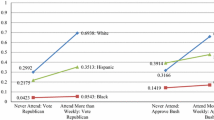Abstract
Changes in the U.S. partisan balance over the past decade are often attributed to the enhanced political salience of cultural issues. Yet as white men have continued to become more Republican in recent years, white women increasingly identify with the Democrats. To the extent that cultural issues are influencing this partisan change, men and women must be responding differently to this cultural agenda. Using a pooled ANES data set from 1988 through 2000, I explore the extent to which cultural values are responsible for this gender realignment. Findings suggest that salient cultural issues influence the partisan choices of both men and women, however in somewhat different ways. For women, the issues themselves—reproductive rights, female equality, and legal protection for homosexuals—have become increasingly important determinants of party identification. For men, the influence of cultural conflict on partisanship is argued to be equally pervasive, albeit less direct.
Similar content being viewed by others
REFERENCES
Abramowitz, Alan I., and Saunders, Kyle (1998). Ideological realignment in the U.S. electorate. Journal of Politics 60: 634–652.
Adams, Greg (1997). Abortion: evidence of an issue evolution. American Journal of Political Science 41: 718–737.
Beutal, Ann M., and Marini, Margaret Mooney (1995). Gender and values. American Sociological Review 60: 436–448.
Black, Earl, and Black, Merle (1992). The Vital South: How Presidents are Elected. Cambridge, MA: Harvard University Press.
Blumer, Herbert (1958). Race prejudice as a sense of group position. Pacific Sociological Review 1: 3–7.
Bobo, Lawrence D. (1999). Prejudice as group position: microfoundations of a sociological approach to racism and race relations. Journal of Social Issues 55: 445–472.
Bobo, Lawrence, and Hutchings, Vincent (1996). Perceptions of racial group competition: extending Blumer's theory of group position to a multiracial social context. American Sociological Review 61: 951–972.
Brooks, Clem (2000). Civil rights liberalism and the suppression of a Republican political realignment in the United States, 1972 to 1996. American Sociological Review 65: 483–505.
Carmines, Edward G., and Layman, Geoffrey C. (1997). Issue evolution in postwar American politics: old certainties and fresh tensions. In Byron E. Shafer (ed.), Present Discontents. Chatham, NJ: Chatham House.
Carmines, Edward G., and Stimson, James A. (1989). Issue Evolution: Race and the Transformation of American Politics. Princeton, NJ: Princeton University Press.
Chaney, Carole K., Alvarez, R. Michael, and Nagler, Jonathan (1998). Explaining the gender gap in the U.S. presidential elections, 1980-1992. Political Research Quarterly 51: 311–340.
Conover, Pamela Johnston (1988). Feminists and the gender gap. Journal of Politics 50: 985–1010.
Davis, Nancy J., and Robinson, Robert V. (1996). Are the rumors of war exaggerated? Religious orthodoxy and moral progressivism in America. American Journal of Sociology 102: 756–787.
Edsall, Thomas B. (1997). The cultural revolution of 1994: Newt Gingrich, the Republican Party, and the third great awakening. In Byron E. Shafer (ed.), Present Discontents. Chatham, NJ: Chatham House.
Erie, Steven P., and Rein, Martin (1988). Women and the welfare state. In Carol M. Mueller (ed.), The Politics of the Gender Gap: The Social Construction of Political Influence, pp. 173–191. Newbury Park, CA: Sage.
Feldman, Stanley and Zaller, John (1992). The political culture of ambivalence: ideological responses to the welfare state. American Journal of Political Science 36:1: 268–307.
Gilens, Martin (1988). Gender and support for Reagan: a comprehensive model of presidential approval. American Journal of Political Science 32: 19–49.
Gilens, Martin (1999). Why Americans Hate Welfare: Race, Media and the Politics of Antipoverty Policy. Chicago: Chicago University Press.
Gilligan, Carol (1982). In a Different Voice: Psychological Theories and Women's Development. Cambridge, MA: Harvard University Press.
Hardy, Melissa A. (1993). Regression with Dummy Variables. Newbury Park, CA: Sage.
Hunter, James Davison (1991). Culture Wars: The Struggle to Define America. New York: Basic Books.
Jelen, Ted G. (1993). The political consequences of religious group attitudes. Journal of Politic. 55: 178–190.
Jelen, Ted G. (1997). Culture wars and the party system: religion and realignment, 1972-1993. In Rhys H. Williams (ed.), Cultural Wars in American Politics: Critical Reviews of a Popular Myth, pp. 145–158. New York: Aldine De Gruyter.
Kaufmann, Karen M., and Petrocik, John R. (1999). The changing politics of American men: understanding the sources of the gender gap. American Journal of Political Science 43: 864–887.
Kellstedt, Lyman A., Green, John C., Guth, James L., and Smidt, Corwin E. (1996). Religious voting blocs in the 1992 election: the year of the evangelical? In John C. Green, James L. Guth, Corin E. Smidt, and Lyman A. Kellstedt (eds.), Religion and the Culture Wars: Dispatches from the Front, pp. 267–290. Lanham, MD: Rowman and Littlefield.
Key, V. O. (1959). Secular Realignment and the party system. Journal of Politics 21: 198–210.
Kinder, Donald R., and Sanders, Lynn M. (1996). Divided By Color: Racial Politics and American Ideals in the American Republic. Chicago: University of Chicago Press.
Kohut, Andrew, Green, John C., Keeter, Scott, and Toth, Robert C. (2000). The Diminishing Divide: Religion's Changing Role in American Politics. Washington DC: Brookings Institution.
Ladd, Everett Carll (1970). American Political Parties. New York: Norton.
Layman, Geoffrey C. (1997). Religion and political behavior in the United States: the impact of beliefs, affiliations, and commitment from 1980 to 1994. Public Opinion Quarterly 61: 288–316.
Layman, Geoffrey (2001). The Great Divide: Religious Cultural Conflict in American Party Politics. New York: Columbia University Press.
Mansbridge, Jane (1986). Why We Lost the ERA. Chicago: University of Chicago Press.
Manza, Jeff, and Brooks, Clem (1998). The gender gap in U.S. presidential elections. When? Why? Implications? American Journal of Sociology 103: 1235–1266.
Mattei, Laura R. Winsky, and Mattei, Franco (1998). If men stayed home... The gender gap in recent congressional elections. Political Research Quarterly 51: 411–436.
May, Ann Mari, and Stephenson, Kurt (1994). Women and the great retrenchment: the political economy of gender in the 1980s. Journal of Economic Issues 28: 533–542.
Merelman, Richard M. (1994). Racial conflict and cultural politics in the United States. Journal of Politics 56:1:1–20.
Miller, Warren E., and Shanks, Merrill (1996). The New American Voter. Cambridge, MA: Harvard University Press.
Page, Benjamin I., and Shapiro, Robert Y. (1992). The Rational Public: Fifty Years of Trends in American's Policy Preferences. Chicago: University of Chicago Press.
Petrocik, John R. (1981). Party Coalitions. Chicago: University of Chicago Press.
Petrocik, John R. (1987). Realignment: new party coalitions and the nationalization of the south. Journal of Politics 49: 347–375.
Piven, Frances F. (1985). Women and the state: ideology, power and the welfare state. In Alice S. Rossi (ed.), Gender and the Life Course, pp. 265–287. New York: Aldine.
Pratto, Felicia, Sidanius, Jim, Stallworth, Lisa M., and Malle, Bertram F. (1994). Social dominance orientation: a personality variable predicting social and political attitudes. Journal of Personality and Social Psychology 67:4:741–763.
Schuman, Howard, Steeh, Charlotte, and Bobo, Lawrence (1997). Racial Attitudes in America: Trends and Interpretations, Rev. Ed. Cambridge, MA: Harvard University Press.
Sears, David O., and Valentino, Nicholas (2001). Race, religion and sectional conflict in contemporary partisanship. Paper presented at the annual meeting of the American Political Science Association, San Francisco, CA.
Shapiro, Robert Y., and Mahajan, Harpreet (1986). Gender differences in policy preferences: a summary of trends from the 1960s and 1980s. Public Opinion Quarterly 50: 42–61.
Sidanius, Jim, and Pratto, Felicia (1999). Social Dominance: An Intergroup Theory of Social Hierarchy and Oppression. New York: Cambridge University Press.
Sniderman, Paul E., and Piazza, Thomas (1993). The Scar of Race. Cambridge, MA: Harvard University Press.
Sobnosky, Matthew J. (1993). Fighting the culture war. American Behavioral Scientist 32: 308–314.
Sundquist, James (1983). The Dynamics of the Party System: Alignment and Realignment of Political Parties in the United States. Washington DC: Brookings Institution.
Wilcox, Clyde (1996). Onward Christian Soldiers? The Religious Right in American Politics. Boulder: Westview Press.
Wirls, Daniel (1986). Reinterpreting the gender gap. Public Opinion Quarterly 50: 316–330.
Yang, Alan (1997). The polls-trends: attitudes toward homosexuality. Public Opinion Quarterly 61: 477–507.
Zaller, John R. (1992). The Nature and Origins of Mass Opinion. New York: Cambridge University Press.
Author information
Authors and Affiliations
Rights and permissions
About this article
Cite this article
Kaufmann, K.M. Culture Wars, Secular Realignment, and the Gender Gap in Party Identification. Political Behavior 24, 283–307 (2002). https://doi.org/10.1023/A:1021824624892
Issue Date:
DOI: https://doi.org/10.1023/A:1021824624892




